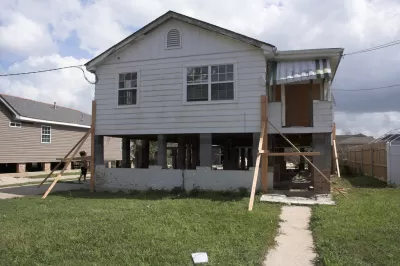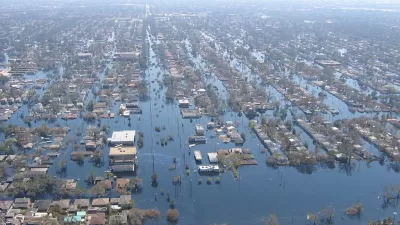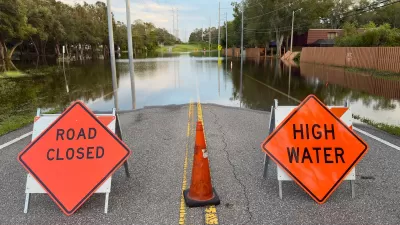Housing market pressures, flood insurance costs, changing FEMA maps, and improved methods of flood control are giving victims of flood damage in Louisiana mixed signals on how high they should rebuild their homes.

As Baton Rouge dries out from its record flooding, homeowners will have a tough choice to make as they seek to rebuild. How high will they need to elevate their homes to avoid future flooding that is becoming more commonplace? David Mitchell of The Advocate reports that a variety of changes in flood insurance requirements, flood maps, and improvements in flood control are giving homeowners less incentive to raise the height of their homes, as was seen across the city of New Orleans following Hurricane Katrina.
Area leaders around Baton Rouge already have an eye on easing the path to return. Baton Rouge and Ascension officials in recent weeks moved to loosen parish rules that had been tighter than FEMA minimum standards, set that way years ago to reap the benefit of lower flood insurance rates.
They have already eliminated requirements that homeowners build to the “record inundation,” an as yet unknown height that local officials feared could be even higher and more expensive than that required for base flood elevations.
Just last week the Metro Council in East Baton Rouge also shifted elevation requirements to the FEMA minimum by eliminating a city-parish rule that would have required some flooded properties in locations not deemed to be at highest risk to elevate. The change spares 32,000 flooded homes -- an estimated half of those that flooded in the parish -- from a possible elevation requirement.
The cost for homeowners to elevate their homes to the base flood elevation has proven costly—forcing homeowners to tear down their existing, damaged homes and just rebuild rather than elevate the existing structures. In New Orleans, a program to provide grants to homeowners to help elevate their homes has largely been sidelined, in favor of a more comprehensive response to contain and prevent future flooding.
FULL STORY: After Katrina, house elevations in New Orleans depended on timing, funding, mindset

Maui's Vacation Rental Debate Turns Ugly
Verbal attacks, misinformation campaigns and fistfights plague a high-stakes debate to convert thousands of vacation rentals into long-term housing.

Planetizen Federal Action Tracker
A weekly monitor of how Trump’s orders and actions are impacting planners and planning in America.

In Urban Planning, AI Prompting Could be the New Design Thinking
Creativity has long been key to great urban design. What if we see AI as our new creative partner?

King County Supportive Housing Program Offers Hope for Unhoused Residents
The county is taking a ‘Housing First’ approach that prioritizes getting people into housing, then offering wraparound supportive services.

Researchers Use AI to Get Clearer Picture of US Housing
Analysts are using artificial intelligence to supercharge their research by allowing them to comb through data faster. Though these AI tools can be error prone, they save time and housing researchers are optimistic about the future.

Making Shared Micromobility More Inclusive
Cities and shared mobility system operators can do more to include people with disabilities in planning and operations, per a new report.
Urban Design for Planners 1: Software Tools
This six-course series explores essential urban design concepts using open source software and equips planners with the tools they need to participate fully in the urban design process.
Planning for Universal Design
Learn the tools for implementing Universal Design in planning regulations.
planning NEXT
Appalachian Highlands Housing Partners
Mpact (founded as Rail~Volution)
City of Camden Redevelopment Agency
City of Astoria
City of Portland
City of Laramie





























